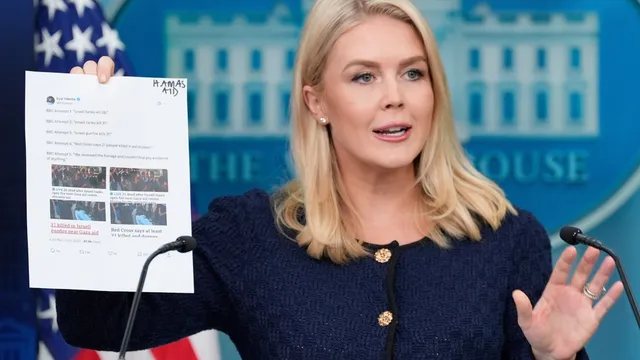
BBC defends its journalism against Trump administration's Hamas claims
2025-06-04 13:01- Karoline Leavitt accused the BBC of relying on Hamas's statements without verification.
- The BBC firmly denied the allegations, stating it stands by its accurate journalism.
- This incident highlights debates over media integrity in reporting conflict situations.
Express your sentiment!
Insights
In a recent statement, Karoline Leavitt, Press Secretary for the Trump administration, accused the BBC of accepting Hamas's accounts as truthful following a deadly incident near an aid distribution site in Rafah, Gaza. Leavitt claimed that the broadcaster had to amend its story multiple times, alleging that it compromised its credibility by failing to corroborate the facts being reported. The BBC, however, responded robustly, asserting that these accusations were completely incorrect and reaffirmed its journalistic standards. They clarified that their reporting was updated regularly to reflect casualty figures as they became available from various sources, indicating the fluid nature of reporting in conflict zones. The incident recalls a broader context of ongoing clashes in Gaza, where varying casualty figures have been reported due to the chaos of warfare. While some initial reports documented 15 deaths, subsequent updates revealed higher figures from the Hamas-run health ministry and other sources, leading to confusion about the actual number of casualties. The international community, including humanitarian organizations like the International Committee of the Red Cross, has been actively monitoring and reporting on such incidents to ensure that accurate information is disseminated. Critics of the BBC's coverage, including members of the Trump administration, have been vocal about their discontent concerning how the global media portrays the conflict. Furthermore, BBC representatives emphasized the challenges of reporting correctly in fast-evolving situations such as war zones, where facts could change rapidly. They made clear that the changes in reporting were necessary to reflect the latest verified information rather than an attempt to mislead or fabricate narratives. The conflict situation remains highly sensitive, and criticisms from political figures, like those from the Trump administration, have been perceived as politicizing the media's role in covering these complex issues. Observers have noted that media organizations must navigate these politically charged environments carefully while striving to uphold the integrity of their reporting. The situation in Gaza continues to draw attention from various stakeholders, raising questions about media accountability, truth in reporting, and the political implications of how conflicts are covered. The ongoing tension between factual reporting and political narratives will likely prompt discussions regarding the responsibilities of journalists and the influence of governments on media portrayal of sensitive international issues.
Contexts
The Gaza conflict has been a focal point of international media coverage for many years, particularly due to its complex historical, political, and humanitarian dimensions. The media's portrayal of the conflict significantly influences public perception and understanding of the situation. Various media outlets adopt distinct narratives and framing techniques, which can lead to varying interpretations of the same events. As researchers analyze media coverage of the Gaza conflict, it is crucial to examine how different stakeholders' perspectives shape the news. This includes looking at the biases inherent in reporting, as well as the language and imagery used to depict both the Israeli and Palestinian experiences. In recent years, the coverage has often intensified during periods of escalated violence, leading to a spike in public interest. However, when the conflict de-escalates, media attention frequently wanes, resulting in a lack of sustained focus on underlying issues such as political negotiations, humanitarian crises, and peace efforts. This pattern raises questions about media responsibility and ethics in providing comprehensive coverage that reflects the ongoing plight of civilians affected by the conflict. Furthermore, the role of social media in disseminating real-time information and personal stories has transformed how audiences engage with the Gaza conflict, allowing for a broader spectrum of voices to be heard, albeit with challenges related to misinformation and propaganda. The impact of visual storytelling cannot be overstated; images and videos have the power to evoke strong emotional responses and galvanize public opinion. Visual representation plays a significant role in shaping narratives, often leading to polarized interpretations. For instance, portrayal of casualties can elicit sympathy for victims, but if framed in terms of military operations, it may convey a different message about legitimacy and justifications for violence. Media outlets must carefully navigate these representations to avoid reinforcing stereotypes or exacerbating tensions. In summary, the media coverage of the Gaza conflict reveals the complexities of how information is conveyed and received. Critical engagement with media narratives is essential for understanding the broader implications of reporting on such a multifaceted issue. Researchers continue to advocate for more balanced coverage, emphasizing the need for long-term perspectives in reporting, which include not only the immediate consequences of conflict but also the enduring quest for peace and stability in the region.